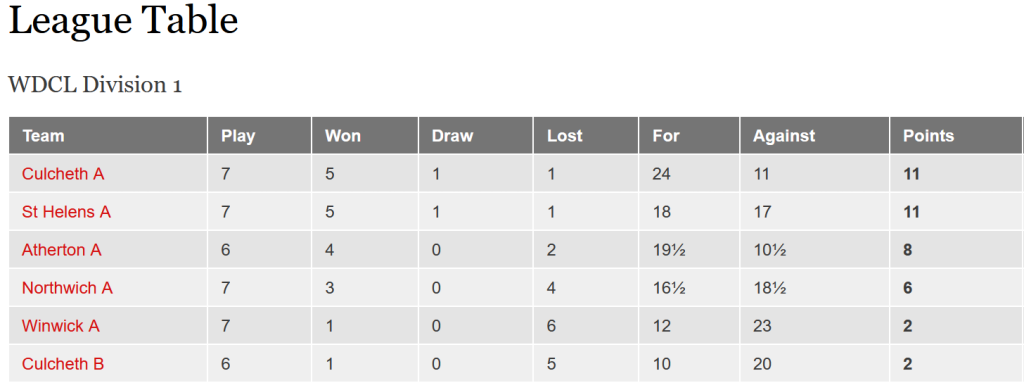Opportunity Lost Authored by Nick – B team captain

This match was of particular importance because not only was the B Team in need of a point or two to ease our relegation worries, but also it provided an opportunity to improve the A Team’s prospects of winning the Division 1 title by denying their closest rivals a victory. The fact that we very nearly succeeded in winning, never mind drawing, the match only to be frustrated by the archaic default time control imposed by the WDCL made for an exasperating experience and an opportunity lost. So, what actually happened?
Well we got off to the best possible start when St. Helens could not field a full team and had to default on Board 5. Somewhat irritating for Alex Robinson who had taken time off from his normal Wednesday evening work activities to play in this encounter, but his mere presence was enough to secure the point.
Martin Brown has been described to me by another very strong player at the club as a ‘class act’ and there is no doubting his immense chess skills which have earned him a master-strength rating of close to 2200. Therefore, Rob Furness as Black had quite a challenge to overcome on Board 1. Despite Rob’s aggressive intent Martin steadily built a positional, then gained a material, advantage when Rob opted for a complex line rather than make a simple recapture. Unfortunately Rob’s position collapsed shortly thereafter, forcing him to resign after 31 moves . All square. (1-1)
On Board 3 Keith Maudsley faced Phoenix Lamb who recently won with a terrific combination against Damian and is clearly developing into a strong player with a great future. Against Keith’s Sicilian Defence he played the Alapin 2.c3, a variation which is gaining in popularity at this level and is not without venom. In the face of White’s initiative Keith held firm, deliberately avoiding the sort of complications that he felt would suit his opponent better. But eventually Keith had to chance his arm with a K-side pawn advance coupled with a Bishop and Queen manoeuvre which threatened checkmate. The initiative had changed hands and the winning chances were well and truly owned by Keith. But what he did not have was sufficient time to bring home the win so a draw was agreed. Still all square. (1.5-1.5)
On Board 4 Andy Coe was always well in control of his encounter against the St. Helens captain, Ray Smith. He thought long and hard before capturing his opponent’s loose pawn on c4 which gave him the slightest of material advantages but Black was not without his own resources. It is still open to debate whether it was Tarrasch or Tartakower who first coined the phrase “all rook endgames are drawn”, but a brief look at the closing moves of this game would lend weight to the axiom. Rubinstein might have been able to win for White but even he would have required more time than was available to Andy by this stage. So a draw it was. Still all square. (2-2)
And so finally to Board 2 where Tom Vout was confronting ‘the man in the fabric mask’ aka Steve Potter. Tom had typically taken and maintained the initiative building a very solid position in the process tying a Black Knight to defensive duties on the b8 square. Steve’s attempt to drum up attacking chances on the K-side were relatively easily neutralised and Tom’s patient build up bore fruit as he invaded Black’s position via the c file. But Steve is a very resourceful player and good at muddying the waters – especially when his opponent is short of time; and Tom was very very short of time. After the exchange of Queens and with only about 30 seconds remaining on Tom’s clock Steve offered, some would say ‘sportingly’, a draw which Tom declined, some would say ‘surprisingly’, believing he had sufficient time to win the obviously won game on the board. But the regrettable truth was that Tom did not have sufficient time and his flag fell so he lost even though, as it transpired afterwards, he had a forced mate in 6 moves. (3-2 to St. Helens)
It would be churlish not to congratulate St. Helens on their victory – especially after defaulting a board. But somehow it feels as though the true winner was the clock coupled with an anachronistic WDCL rule.


